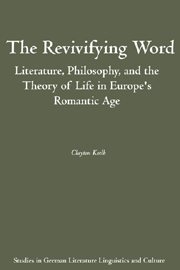Conclusion
Published online by Cambridge University Press: 05 February 2013
Summary
THE ROMANTIC CENTURY DISPLAYED an abiding interest in exploring the boundary between life and death. The natural philosophy of the late eighteenth century suggested that life might be a fundamental characteristic of all matter. What an observer perceives as life, however, is in fact the presence of a Geist, a spirit/intellect that comes into being as a result of matter organized to a particularly high degree. Life inheres in all things, but spirit varies proportionally with the level of matter's organization. When that organization breaks down, spirit breaks down as well, and organisms experience the rupture that we normally think of as death. Such a death is not the departure of life, however; the constituent elements of the body are all still alive, all still capable of reorganization into a being endowed with spirit. According to this model of the natural world, that which is dead is always capable of being revivified.
The foregoing study has examined one cultural paradigm for such revivification: the process of reading, in which apparently dead material objects, letters inscribed on some surface, can return to life as the embodiment of a human spirit. The abiding possibility of such a textual resurrection thrilled and horrified the European intellectual community with remarkable consistency over a remarkably long period of time. The possibility of being “alive again” (as the epigraph to the opening chapter of Melmoth puts it) is both exhilarating and terrifying, and we find both emotional extremes explored in the literature of the period.
- Type
- Chapter
- Information
- The Revivifying WordLiterature, Philosophy, and the Theory of Life in Europe's Romantic Age, pp. 181 - 184Publisher: Boydell & BrewerPrint publication year: 2008



